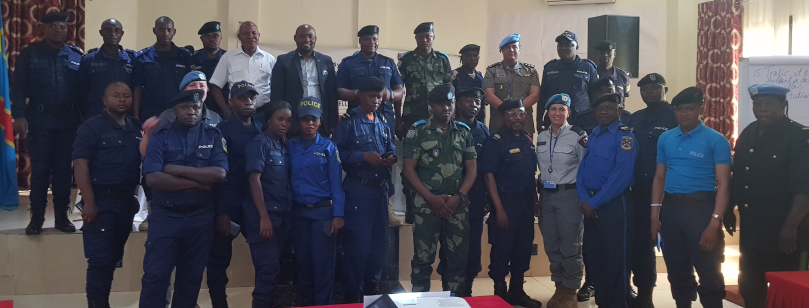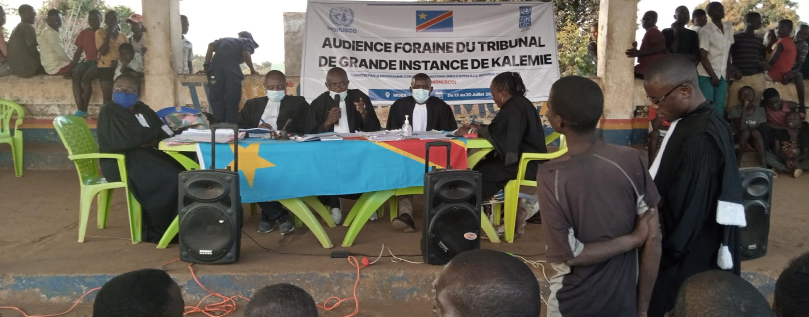Impact by Regions, Countries & Territories
UNDP’s Global Programme supports crisis-affected contexts across all regions to strengthen the rule of law and human rights. In this section, we present five regional overviews, detailing our priorities and approach depending on the context, as well as feature select country and territory results from 2021.
Five contexts from the list (Central African Republic, Democratic Republic of the Congo, Haiti, Mali and Yemen) illustrate the achievements of the Global Focal Point for the Rule of Law (GFP). In peacekeeping missions and transition settings, UNDP’s Global Programme works through the GFP to deliver integrated assistance with our UN partners.
GFP Global Focal Point Highlights
Political
Engagement
The rule of law is essential for sustainable peace and resilient economies, as well as for the prevention or recurrence of conflict. To prevent or address injustice, inequalities or democratic deficits, UNDP works with multiple stakeholders to operate in a way that is consistent with the rule of law and creates opportunities for all individuals to exercise their rights and access justice.
Institution
Building
The importance of strong institutions is more evident than ever as countries and communities respond to disruption, whether because of public health restrictions, climate change or political upheaval. Limitations on public gatherings and travel have revealed the need for institutions that are resilient to disruption.
Community
Security
2021 was a pivotal year that saw various developments affecting peace and security around the world. Civic space continued to shrink and the social contract between states and citizens was increasingly challenged, particularly during and after the response to the COVID-19 pandemic. Facing distressing consequences of climate change, states and communities are forced to manage more cross-border conflicts, triggered by the displacement of people seeking increasingly scarce resources.
Human Rights
Systems
The scope of human rights challenges is widening, from eroded public trust and shrinking civic space to ongoing inequality and human rights impacts in the socio-economic repercussions of the COVID-19 pandemic, and emerging risks in the digital sphere. National human rights institutions (NHRIs), along with other human rights defenders, are facing rising and sophisticated forms of reprisals for carrying out their work.
Access to
Justice
Sustainable Development Goal 16 (Peace, Justice and Strong Institutions) of the 2030 Agenda highlights the importance of access to justice for all for the development of peaceful and inclusive societies. Meaningful access to justice can only be achieved when people know their rights, have the opportunities, agency and capacities to claim them, and have access to independent, inclusive and people-centred justice systems that will respond in a timely, fair and effective manner.
Transitional
Justice
Without justice, there can be no lasting peace. In post-conflict, crisis-affected and fragile contexts, truth-seeking initiatives and reconciliation efforts are essential to bring peace to affected communities. The COVID-19 pandemic has slowed down transitional processes as states prioritized their response to the health crisis and measures to support the economy.
Gender
Justice
In 2021, the continued erosion of democracy and the spread of authoritarian trends in politics in many parts of the world contributed to a backlash against women’s rights. The COVID-19 crisis has reversed some of the hard-won gender parity gains by exacerbating pre-existing inequalities and power imbalances. It has also caused a dramatic increase in sexual and gender-based violence (SGBV). All these challenges have been particularly acute in conflict, fragile and crisis-affected settings.
Innovation
New ideas and new strategies are critical to building sustainable and effective development approaches that really meet people’s needs. Technologies and globalization raise new human rights concerns and threaten the rule of law. Responses to the COVID-19 pandemic continue to limit people’s access to basic services. UNDP connected expertise across the globe to learn and adapt. Creating a culture of curiosity and experimentation, these efforts ensured that local needs and expertise were combined with emerging models to bring strategic thinking to people-centred development goals.

DRC
In 2021, the UN Joint Support Programme for Justice became operational in the Democratic Republic of the Congo (DRC). The programme will run until 2024 implemented jointly by UNDP, The United Nations Organization Stabilization Mission in the Democratic Republic of the Congo (MONUSCO) Justice Support Section, Corrections Unit, United Nations Police (UNPOL), United Nations Joint Human Rights Office (UNJHRO) and the Team of Experts within the framework of the Global Focal Point (GFP). The key government stakeholders are the Ministry of Justice and the Superior Council of the Judiciary and its provincial authorities. The focus of the programme in 2021 was to plan the progressive withdrawal of MONUSCO in Kasai Central and Tanganyika to ensure a smooth transition to the national counterparts.
The overall situation in DRC remained tense. Although the formation of the new government in April 2021 led to a certain political stability, the security situation continued to be volatile, with fragile justice institutions, rampant impunity and corruption. The negative impact of the COVID-19 pandemic persisted across the country. Despite the stabilization measures put in place by the government in the eastern regions, human rights violations and deadly attacks by armed groups targeting civilians and the displaced population did not stop. All of these factors have affected access and mobility for UN personnel and their ability to monitor the situation and report on it, as well as to carry out activities with national counterparts.
To strengthen the rule of law in DRC, the joint programme prioritized improvements in the criminal justice chain by strengthening capacities of justice actors and the fight against impunity for human rights violations and war crimes. UNDP contributed to improving the working environment for justice actors, enabling them to improve the quality of justice services and reinvigorate efforts to advance access to justice.
For example, the joint programme supported rehabilitation and the provision of equipment for the central prison of Kananga, the urban prison of Boma, and the two administrative buildings and a courtroom at the central prison of Makala.
Together with partners, UNDP supported capacity building of the criminal justice chain actors. Training on managing and securing prisons was provided for 92 prison employees (including nine women). 110 registrars and court clerks (including 44 women) obtained new skills to better process files and follow up on detention delays. 237 judicial police officers (including 17 women) were trained on the investigation techniques in cases that involve war crimes and conflict-related sexual violence (CRSV). 500 police officers (including 55 women) were sensitized on the fight against sexual and gender-based violence (SGBV).


On legal aid and access to justice, the joint programme supported the mobile hearings of the Tribunal de Grande Instance of Kalemie and Kananga within the penitentiary establishments of Kongolo, Moba and Luiza. A total of 154 cases were processed, and 137 court decisions were rendered (107 convictions and 30 acquittals). The mobile courts allowed justice to be brought to 67 detainees and seven victims, and to reduce the prison population.
In 2021, the joint justice programme supported progress in combating impunity for international and human rights crimes, including CRSV. UNDP contributed to the organization of three fact-finding missions and setting up nine mobile courts to implement provincial prosecution prioritization strategies and to conduct evidence-based investigations. In total, 14 emblematic priority cases (four cases from North Kivu, seven cases from South Kivu and three from Ituri) were considered and closed. Since 2015, military courts in the provinces have recognized CRSV as a constituent element of a crime under international law in 79 percent of the closed priority cases, particularly in the Sheka, Kavumu, Marocain and Haburgira cases.
In addition, the joint justice programme created a pool of lawyers in Bar Associations specialized in international criminal law to improve the quality of the legal assistance.
In 2022, the UN Joint Support Programme for Justice will continue the MONUSCO transition to national counterparts as well as resource mobilization to ensure further support to judicial counterparts and the people. The Joint Programme for Police Reform that will start in mid-2022 will be closely linked to the justice programme to ensure holistic, sequenced and complementary delivery of tangible results for beneficiaries.
106 prioritized war crimes cases to be considered by military courts

Key Results: DRC
Six provincial prosecution strategies were developed by the national partners with the support of the UN to prioritize 106 war crimes cases to be considered by military courts. Out of these, 62% have made progress in the justice process, of those cases 68% are under investigation, 12% are in the process of trial and 20% are under appeal. Among the priority cases, 50% include conflict-related sexual violence.
Mobile courts in three penitentiary establishments processed 154 outstanding cases and rendered 137 court decisions (107 convictions and 30 acquittals), reducing the prison population and bringing justice to 67 detainees and 7 victims.
Fourteen emblematic court cases were considered and closed in 2021, leading to the conviction of 170 perpetrators of war crimes and/or crimes against humanity in favor of more than 2,485 victims.
